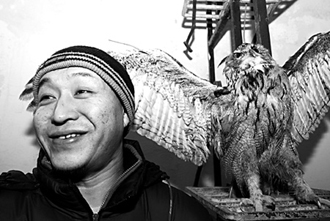| Tools: Save | Print | " target="_blank" class="style1">E-mail | Most Read |
| Wounded Wildlife Warmed by Caring Hands |
| Adjust font size: |
|
Morning, January 12, 2006. Southern Lake Park of Shenyang. This was the coldest moment of the year here in Northeast China. Outside, it was around 20 degrees below zero. There were only a few senior citizens doing exercises in the park.
Lan Yiling, wearing a helmet, a thick blue down jacket and a dark woollen hat, was feeding a lame fox in an exhibition hall. There was no heating or air conditioning inside the room.
"The fox was sent here by Shenyang Wild Animal Protection Centre last year. At that time, he had just lost his right foreleg and could not eat by himself. Now, look what a good appetite he has," Lan said with a smile.
Lan, 38, once an insurance salesman, is running a dinosaur fossils exhibition in Shenyang. He began taking in wounded and disabled animals in 2002. Lan has also helped raise abandoned dogs and cats in the 3,000-square-metre exhibition hall. The lightly wounded are set free after being treated, while disabled animals like the blue fox are adopted.
The first animal was a little bird sent by a young visitor, recalled Lan.
"I was completely moved by its little dark helpless eyes. It could not speak. But I could tell how terrified it was. We human beings can call for help when in trouble but birds can do nothing but look at you," said Lan.
Since then, Lan started gathering wounded wildlife including blue foxes, dogs, Bangladesh lizards, tortoises, owls, birds, and racoons.
Later local citizens would bring Lan animals they found. Lan's fossil exhibition hall in fact has become an asylum for wildlife lost in downtown Shenyang.
Peng Jianxu, a member of staff from the Shenyang Wild Animal Protection Centre, told China Daily they appreciate Lan's work and have delivered wounded wild animals to him since 2004. The number reached around 500, according to Peng.
Challenging job
The hall Lan rents is almost totally occupied by cages for animals, and 200,000 yuan (US$24,660) in exhibition fees has been spent on them.
"The process is rather torturing when you could not raise enough money and worry about their future. I do have a hard time and thought about giving up," said Lan. "But this is the business I have looked for for years. I enjoy helping wounded animals, especially the moment when I see them going back into the wild. It reinforces my will," Lan said.
Last October, Lan and his friends released 400 animals that had been cured and can now live independently.
"The birds hovered over us and did not want to go away," said Lan. "They could not speak but I know their gratitude and love for us."
To see the cured animals leaving is a rather happy experience. But the work ahead is not easy.
To keep so many creatures is a real challenge, because this means a vast input of money, time and love.
The first and most important factor is money.
In order to raise animals, Lan has sold his house and lives inside the hall with them. But to provide medical treatment and food is not easy.
In order to make money, Lan drives a taxi at night when the exhibition business is not generating enough money.
The second hurdle is that most people do not understand his actions, even his own sister, who used to invest in Lan's business.
Moreover, the park administration recently informed Lan that it would take back the hall Lan rents and rebuild a teahouse on the site.
"I can understand them. It is the market economy. Everybody wants to make money. But where shall my animals go?" said Lan.
Not alone
However, what comforts Lan is that there are more and more people giving him a helping hand.
Lan organized a wildlife protection organization last year and already has more than 200 members. Most of them are middle school students.
Some citizens volunteer to take animals home with them as Lan's exhibition hall has become colder and colder since October.
"Lan is so selfless, I am moved by his love for animals," said Liu Yingying, a member of Lan's wildlife protection organization.
Liu has taken home a red mouthed parrot from Lan's exhibition hall.
Some local entrepreneurs have contacted Lan and intend to provide financial assistance.
"This is a significant job. Lan is an unusual man who has a special dream to help animals," Wang Zishan, manager of Diamond Life Celebration Company said. Wang promises to provide 50,000 yuan (US$6,165) of aid for Lan every year.
Lan is not the only one engaged in this work.
Chen Rongxiao has worked for Lan for almost three years. "Our society is becoming more and more money-oriented. It is so hard to find one who wants to work in the public interest. I am lucky as I found one," said Chen.
Chen has not been paid for three months because there are few visitors in the winter. Chen confessed that she is also looking for some part-time work. But she will keep helping Lan if she can.
"I have to live, anyway. But I won't go for a full time job so I can find time to help him," she said.
Despite all the difficulties, Lan is still optimistic.
"I always told myself that these disabled animals need us," Lan said. "I believe more and more citizens will join me in helping animals. And I wish I can hold a large scale dinosaur exhibition in Beijing in 2008 so that my beloved wild animals will live a better life."
(China Daily January 24, 2006) |
| Tools: Save | Print | " target="_blank" class="style1">E-mail | Most Read |
 |
| Related Stories |

